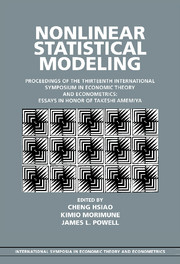 Nonlinear Statistical Modeling
Nonlinear Statistical Modeling Book contents
- Frontmatter
- Contents
- Series editor's introduction
- Editors' introduction
- Contributors
- 1 Local instrumental variables
- 2 Empirically relevant power comparisons for limited-dependent-variable models
- 3 Simulation estimation of polychotomous-choice sample selection models
- 4 A new approach to the attrition problem in longitudinal studies
- 5 Semiparametric estimation for left-censored duration models
- 6 Semiparametric estimation of censored selection models
- 7 Studentization in Edgeworth expansions for estimates of semiparametric index models
- 8 Nonparametric identification under response-based sampling
- 9 On selecting regression variables to maximize their significance
- 10 Using information on the moments of disturbances to increase the efficiency of estimation
- 11 Minimal conditions for weak convergence of the sample standardized spectral distribution function
- 12 Unit root tests for time series with a structural break when the break point is known
- 13 Power comparisons of the discontinuous trend unit root tests
- 14 On the simultaneous switching autoregressive model
- 15 Some econometrics of scarring
- 16 A censored switching regression approach to evaluating the effect of sunk costs and firm-level disequilibrium on export performance
- Curriculum vitae of Takeshi Amemiya
- Index
5 - Semiparametric estimation for left-censored duration models
Published online by Cambridge University Press: 05 June 2012
- Frontmatter
- Contents
- Series editor's introduction
- Editors' introduction
- Contributors
- 1 Local instrumental variables
- 2 Empirically relevant power comparisons for limited-dependent-variable models
- 3 Simulation estimation of polychotomous-choice sample selection models
- 4 A new approach to the attrition problem in longitudinal studies
- 5 Semiparametric estimation for left-censored duration models
- 6 Semiparametric estimation of censored selection models
- 7 Studentization in Edgeworth expansions for estimates of semiparametric index models
- 8 Nonparametric identification under response-based sampling
- 9 On selecting regression variables to maximize their significance
- 10 Using information on the moments of disturbances to increase the efficiency of estimation
- 11 Minimal conditions for weak convergence of the sample standardized spectral distribution function
- 12 Unit root tests for time series with a structural break when the break point is known
- 13 Power comparisons of the discontinuous trend unit root tests
- 14 On the simultaneous switching autoregressive model
- 15 Some econometrics of scarring
- 16 A censored switching regression approach to evaluating the effect of sunk costs and firm-level disequilibrium on export performance
- Curriculum vitae of Takeshi Amemiya
- Index
Summary
Introduction
The problem of left censoring was discussed by Professor Amemiya in his book Advanced Econometrics in 1985 (see Amemiya 1985, pp. 447–448). Consider the estimation of unemployment duration when the statistician samples individuals from the pool of unemployed persons and later interviews them and asks how long they have been unemployed. This incurs the problem of left censoring; ignoring it leads to overestimating the mean duration, since longer spells tend to be observed more frequently than shorter spells. This effect is called selectivity bias and needs a special treatment.
Some other authors have noticed and studied the problem (see, e.g., Lancaster 1979, Chesher and Lancaster 1983, Ridder 1984, and Heckman and Singer 1984). To the best of our knowledge, however, Amemiya (1991) is the first paper to give a complete, unified treatment of this problem, including asymptotic properties. According to it, three types of left censoring arise. We assume that spells in progress at the time of the first observation are either completely or partially observed. Suppose such a spell started at x, continued to 0 (the time of the first observation), and ended at s. The statistician may observe both s and x (by asking how long the spell lasted), only s, or only x. Amemiya (1991) calls those cases types 1, 2, and 3, respectively.
In each possible case we have to consider how the selectivity bias is eliminated.
- Type
- Chapter
- Information
- Nonlinear Statistical ModelingProceedings of the Thirteenth International Symposium in Economic Theory and Econometrics: Essays in Honor of Takeshi Amemiya, pp. 145 - 164Publisher: Cambridge University PressPrint publication year: 2001


